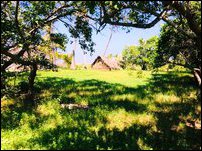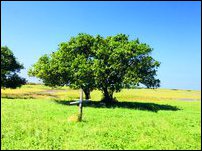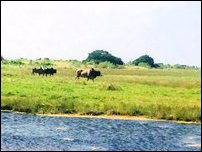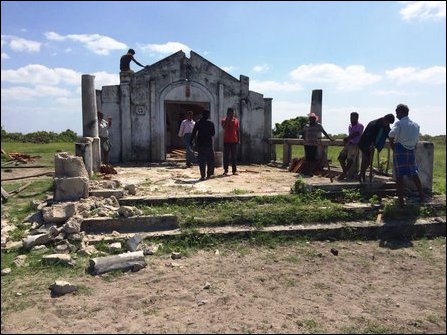Fisheries society and Rural Development Society representative Amirthanathan Robert Kennedy said the move was aimed at hampering reconstruction of the village, which was economically self-sufficient even during the times of wars.
It is the SL Navy along the coast of the mainland which is pre-occupied with the surveillance and harassments of NGO, community workers as well as outsiders visiting the islet. The naval personnel in Ira'nai-theevu are not harassing them, the residents told TamilNet.
The families are unable to resettle in full as due to the lack of infrastructure. However, around 60 families have resettled without basic facilities. “Be it education, electricity or potable water, nothing is there, but the people are very much motivated to move into their own village,” Mr Kennedy said.
“We are unable to deal with snake-bite to death by natural causes. There is no medical facility, and there is no burial site as it used to be earlier.”
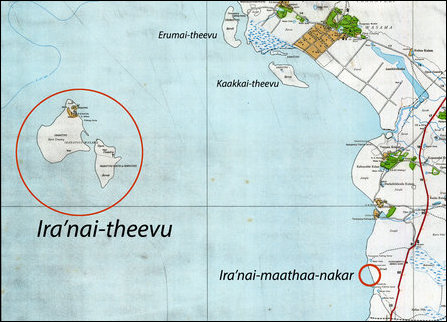
The uprooted people from Ira'nai-theevu are staying at Ira'nai-maathaa-nakar since 1992. The locations of Ira'nai-theevu and Ira'nai-maathaa-nakar are shown in the map. [Image Courtesy: British made One Inch Map, revised in 1972 by ‘Sri Lanka’ Survey Department, Legend by TamilNet]
The people have also been unable to secure proper assistance in their quest to regain their cattle from the SL Navy zone.
Until the infrastructure is complete, most of the families, especially those with school-going children and seniors, have to stay at Ira'nai-maathaa-nakar along the coast of the mainland.
Most of the men are now engaged in fishing from the islet, and they are eager to resume sea cucumber by diving without proper facilities. January is the season for harvesting sea cucumber there.
Poonakari Divisional Secretariat officials were reluctant to comment about the harassment coming from the SL Navy.
However, when questioned about the progress in providing potable water, the resumption of the school, allocating a housing scheme and the provision of transport arrangements, the Divisional Secretariat officials admitted that these were yet to materialise.
The UNDP has expressed its willingness to provide livelihood assistance to 50 families while the Northern Provincial Council has formally agreed to help 50 persons. However, these are only in letter correspondences, the Tamil officials, who didn't want to be mentioned by name, told TamilNet.
So far, the UNDP has assisted the people with material for 60 temporary huts. The UN agency has also provided sanitary facilities. The much-expected assistance from the UNDP is the facilitation of potable water, which is one of the main problems now, is still not forthcoming.
The officials also mentioned that the Sri Lanka Canada Development Fund (SLCDF) which is now operating as Sri Lanka Centre for Development Facilitation, as willing to provide some assistance, they said.
In the meantime, the SL Resettlement Ministry is reluctant to respond to the applications for the housing scheme, the officials said.
The Catholic parish priest was assisting the people to file their claims and report the basic needs. The Divisional Secretariat had forwarded these requests to the higher authorities.
The people are also demanding a proper boat service as in the islets off Jaffna. The Divisional Secretariat only managed to secure a small fibreglass boat and engine from Ki'linochchi District Secretariat, the officials said. The people making use of the boat service have to pay for kerosene and the operator. It would cost around 4,000 rupees for a trip to the islet.
The resettling people said they also need fisheries infrastructure and necessary equipment to sustain their livelihood.
Most of all, they need the necessary infrastructure such as potable water, medical facility, school and a cemetery without further delay, Mr Kennedy said.
The resettling people are also pushing for reconstructing the St Sebastian church with an aim to conduct the annual feast there.

